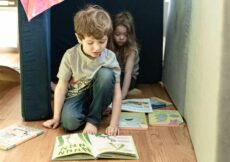I don’t love my children the same way.
At least, I don’t if “love” is, as I truly believe, more often an action than it is a feeling.
I love—the feeling—both my children fiercely and deeply in equal measure if a mother’s love is something that can actually be measured.
But I do not love—the action—my children in the same way, because love has to look and sound like something to the person being loved, and my two teens see and hear love in different ways.

My first child was an easy baby and child
Loving my first baby through the teenage years did nothing to prepare me for walking through these years with her younger sister. My older daughter is my pleaser, my hugger, my personal cheerleader. This is the child who has me listed as “mommy” on her phone and jokes that we won’t have to worry about her coming home for Christmas when she’s an adult because she’s never going to have left in the first place.
My second and last baby is my strong-spirited child who prefers not to be hugged and who’s called me “mom” for a long time. She’s fascinating and intricate and determined. She’s a complex puzzle worth putting together and a dance worth every tricky step…but parenting her is an intense experience.
With her, I’m needing to find ways to love a child who sometimes doesn’t even seem to like me. I’m needing to learn how to give out love that’s not always obviously given back.
This is love the choice, the decision, the action, and I’m learning how to do it as I go.
I’m learning a different way to love my second child
I’m learning to still say the words “I love you.” I’m learning to say them even when I don’t feel like saying them. I’m learning to say them when they’re only returned with a mumbled “love you” as my daughter is bolting out of the car in the school drop-off line. I’m learning to say them when they are not returned or acknowledged at all. I still say them, because no matter what, they’re still true.
I’m learning to speak love in other languages. I’m learning to speak it in the dialects of small gifts and acts of service. I speak it by stocking up on the protein bars my high-schooler takes for lunch every day and by washing her dance clothes, babying them along on the gentle cycle and pulling them out of the load before it gets thrown into the dryer. And sometimes, I speak love by forcing myself not to say anything at all.
I’m learning to show love by showing up. My daughter is stoic and stone-faced and makes no eye contact when she files past me sitting in the stands at her marching band competitions. She does not get out of line to come give me a hug or even say hello when I’m handing out third-quarter snacks to her bandmates after they play their halftime show.
At her awards ceremonies, there is no option of a photo-op with her smiling proudly, standing between her dad and me, and displaying the certificate we’ll add to the collection we started in kindergarten. But I keep showing up for these things anyway because love shows up. I keep showing up because whether or not it matters to her that I’m there, it matters to me that she knows I’m there. And I keep showing up because I believe there is power in presence.
I’m learning to love by taking what I can get with gratitude. A few mornings ago, when my daughter got in the car for the ride to school, she surprised me by enthusiastically asking, “Did you smell the air? Did you smell the Froot Loops?” (We live near Battle Creek, Mich., the Cereal Capital of the World, where the air some mornings do, in fact, smell like Froot Loops.)
Her question caught me off guard because morning conversations are usually limited to me asking when she needs to be picked up and her responding with the fewest number of words necessary for communicating information that will keep her life on track. I could have answered her tersely, as she often does when I ask her about something. I could have reigned in my response in anticipation of being rebuffed. But instead, I made myself take the moment for what it was.
I matched her enthusiasm and told her, “Yes! I did! Isn’t it great that we live in a place where this is what we get to smell in the mornings?” I’m learning to receive gifts of interaction and connection as they’re offered, not because I’m groveling but because I’m trying to be grateful.
I’m learning to love by reinforcing the good. At the last home football game of this year’s marching band season, my drumline girl was in a familiar funk. Also familiar: I had no idea what the problem was. I asked if she was okay even though the answer was obvious, and she muttered something about a cramp and wandered off.
We picked her up at the end of the night, and her earbuds immediately went in as usual, but when we got home and were walking into the house, she said, “Oh, Mom, I wanted to let you know that I did have that weird cramp and I thought the rest of the night was going to be miserable, but I ended up laughing with my friends and having a really good time.”
“I’m so glad to know that,” I told her. “Thank you for telling me.”
There is much these days I want from my daughter that I don’t get. So when she gives me something I’d like more of, I’m learning to put an exclamation point on it.
Loving this wonderful but tricky teen of mine can be tough sledding. I’m never quite sure how things are going to play out. But here again—as in all of parenting—I have to remind myself that my job is not the outcome; my job is the input. So I’ll keep inputting love while I hold onto hope that the outcome will be love received and love given back.
You Might Also Love:



































